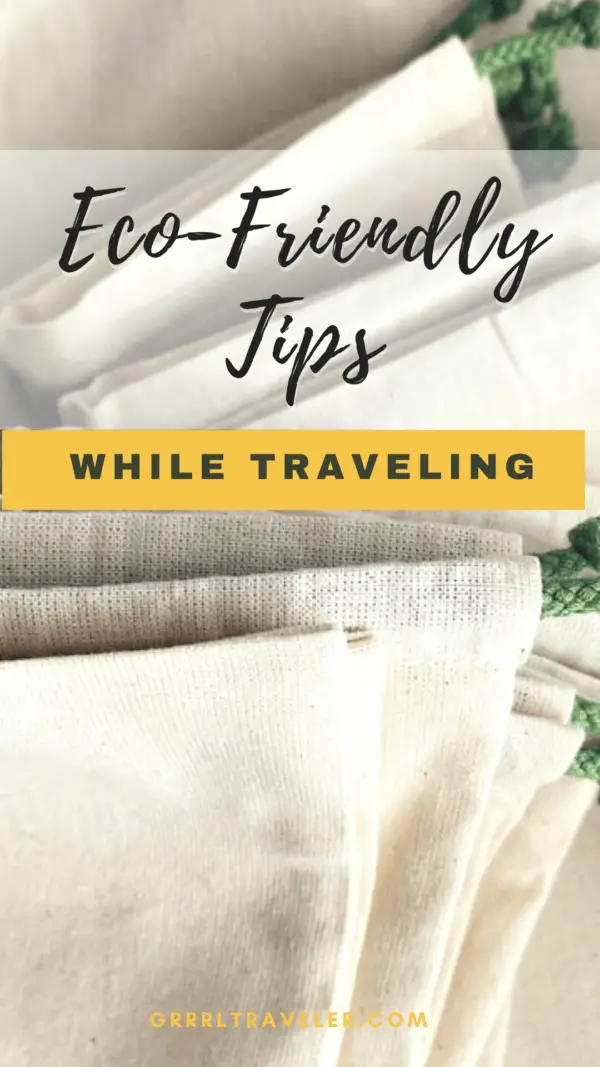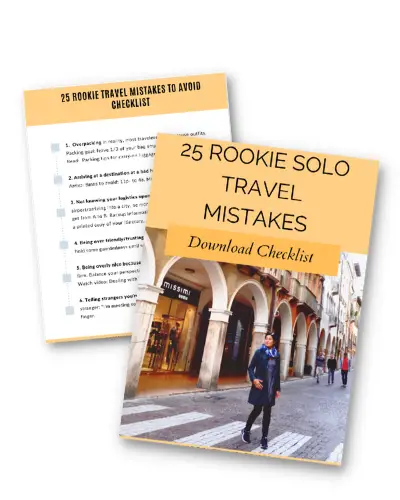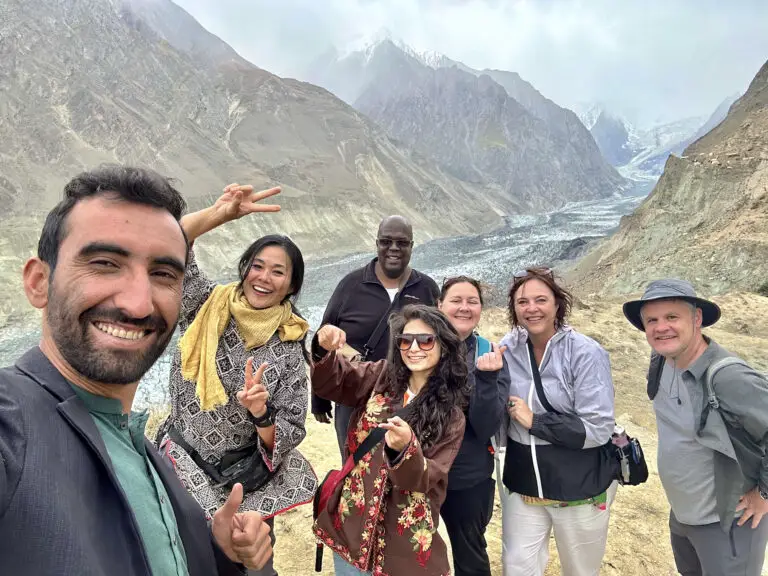Last Updated on July 15, 2023 by Christine Kaaloa

Mass consumption, over-crowdedness and consumer trash and pollution,… as travelers, we can help offset the negative impact of tourism by being conscious travelers. We can reduce our carbon footprint when we travel. In this post, I share eco-friendly tips for travelers.
How I became a conscious traveler
Table of Contents: 14 Best Eco-Friendly Tips for Travelers
- 1 14 Best Eco-Friendly Tips while Traveling
- 1.1 Recycle & Reuse
- 1.2 Conserve
- 1.3 Reduce waste
- 1.3.1 8. Put out the ‘Do Not Disturb’ sign.
- 1.3.2 9. Take your own amenities or fully use the hotel toiletries.
- 1.3.3 10. Stay at a Green Hotel
- 1.3.4 11. Travel overland
- 1.3.5 12. Walk, bike, e-scooter, and use public transportation to get around
- 1.3.6 13. Buy produce from local markets
- 1.3.7 14. Buy locally-made products
- 1.3.8 15. Use reef-safe sunscreen
- 1.3.9 What are your eco-friendly tips for reducing your carbon footprint when you travel?
I wasn’t always a conscious traveler. When I traveled in the U.S. for work, I misused, wasted, and over-consumed, substituting that as a privilege I didn’t have in my normal life. I had the hotel maid make my room each day with fresh sheets and towels while cracking open new toiletry bottles after only a single use… I told myself I deserved this.
Check out my Guide on 30 Ethical Travel tips for the Responsible Traveler
Until I started traveling to developing countries in Southeast/East/Asia, where I witnessed poverty and fragile infrastructures, I didn’t understand how my negligence negatively impacted the cultures I entered. This was my wake-up call and reset to the road of conscious travel.
14 Best Eco-Friendly Tips while Traveling
Recycle & Reuse
1. Take a reusable fold-up bag for groceries or shopping.
To avoid plastic bag usage, I pack a Flip & Tumble fold-up bag to use as a shopping and in-flight bag. I love these!
If I do get a plastic bag from a shopping purchase, I save it to use it later on my trip. I use them for: garbage bags, protective covers for camera gear, disposing of sanitary napkins, storing dirty shoes, …even keeping nice clothes from getting wrinkled.
2. Take a BPA-free water bottle or reuse your water bottles
Each time we buy bottled water and soft drinks we’re adding plastic bottles to environmental waste. More and more airports have water filling stations and this is a wonderful thing because it is starting to recognize and invite the use of reusable and recyclable bottles. Additionally, if a community has water fountains or water refill stations, I use that over buying bottled water.
In the past, my travel hack was to buy one plastic liter water bottle before my trip and reuse and refill it all the way through. I didn’t want to carry a heavy (and costly) hydroflask which added to one more item to be responsible for not losing; additionally, I wasn’t crazy about adding ounces to my already heavy camera backpack. It meant I could lose or forget it and not feel like I was out-of-pocket for the loss. Well, i’ve found a better water bottle hack…
Tip: These days, I buy Pathwater– it’s actually 9.5 PH balanced water with electrolytes, but more importantly to me as a responsible traveler, it comes in a light-weight, wide-mouth design for easy refilling, and easy to care for. Just hand-wash or shake with a few drops of dish soap and warm water, then rinse.
3. Using a water filtration system
In countries, where the water may not be safe to drink, rather than buy bottled water, take a water filtration system such as a LifeStraw or SteriPen UV water purifier.
Read Ways to Avoid Buying Bottled Water
Conserve
4. Take shorter showers
Water can be a precious resource in some countries. Try to reduce your shower time. If possible, turn the water off while you’re soaping up.
At one eco-friendly guesthouse in India, I’d slide a bucket under the shower to catch the excess water. I used that extra water to wash my clothes.
5. Save on the flush & reduce toilet paper use
It’s not necessary to flush each time you use the toilet. I know every individual has a different tolerance on this, but depending on the toilet, each flush uses around 6-9 liters of water. That’s a lot of water.
The mantra: If it’s yellow, keep it mellow. If it’s brown, flush it down.
Instead of wadding up the unnecessary toilet paper, be more mindful. Paper degrades over time but it still takes time and depending on the aging of the systems, could even pose problems by clogging drain pipes.
6. Turn the lights off and the air-conditioner before leaving your room
Do you really need to keep all the lights on in your room or your air-conditioning running when you are away? It’s easy to forget this when staying at a lavish resort; it’s very easy to remember when staying at a hotel in a developing country. By using only what you need, you are helping to cut back on over-consumption. I try to make consciousness a habit.
7. Burn off calories and take the stairs
I generally like to walk stairs over elevators and escalators. I also prefer walking to airport conveyor walkways; unless there is an energy-efficient option of motion-activated walkways, operating only when it detects someone coming. Otherwise, walking is my healthy way of getting around. It keeps the joints well-oiled and beats a gym treadmill. The more I walk also makes me feel guiltless when it comes to eating the cultural cuisines.
Tip: Pack light and take a wheeled backpack convertible carry-on.
Reduce waste
8. Put out the ‘Do Not Disturb’ sign.
At home, do you use a new towel each day or have your room made each day? I don’t need someone to change my sheets each day, I don’t need a new bar of soap and with all the camera gear I tote, I actually do not like people in my room. Instead, I put the Do not disturb sign out and have housekeeping come once or twice a week. This reduces any extra cleaning and laundering chemicals used in cleaning or waste in throwing out partially used amenities to refresh them with new ones.
9. Take your own amenities or fully use the hotel toiletries.
Bring your own amenities, such as shampoo and soap. Many western hotels have crap shampoo anyways, I find. So often, I’ll pack used toiletry bottles and soaps, which I’m almost finished with because I like to buy souvenir toiletries to bring home.
Also, fully use your toiletries, before asking the maid to replenish your stock. Used hotel bar soaps are often discarded after you depart, so try to use it up. If you haven’t used what you’ve opened, you can them home or donate them to the homeless. Check out my essential solo travel gear for more ideas.
Try my ultimate packing checklist tool and download your personal packing checklist!
10. Stay at a Green Hotel
Green hotels are eco-friendly hotels, which value and implement sustainability initiatives, which reduce the negative impact tourism and consumption can have on the environment. These hotels can have a recycling program, solar power, recycled toilet paper, low flush toilets, no plastics rule, energy-efficient lighting, etc…; some are even agro-resorts that source food from their own garden.
So far I’ve stayed at a green hotel in Kathmandu and a few really good hotel chains in Sri Lanka like Cinnamon Grand Colombo Hotel and Jetwing Kuduretheka (my favorite hotel), Jetwing Jaffna, Jetwing Negombo ; they were like staying at a boutique hotel and I hope to stay at more.
Read Tips for Staying at a Hotel
11. Travel overland
Did you know that one air mile produces 53.3 pounds of carbon dioxide? In 2019, the airline industry produced 915 million tons of carbon emissions. Thus, traveling overland helps reduce that impact. Take a bus or train; it has less negative impact than a plane. So kick back and enjoy the scenery.
Want to book a flight? Tips for booking cheap flights
12. Walk, bike, e-scooter, and use public transportation to get around
Shared rides such as public buses or overnight trains and low-cost fuel-efficient rides like bikes and motorbikes, all do their part to lessen the negative impact of transportation. These days, more bike rentals and e-scooters are arriving at destinations and you can rent them to sightsee a city on your own or explore on them with the help of guided tours. They are also a lovely way to connect with your environment and vibe with local life.
13. Buy produce from local markets
Before boarding a long-distance bus or train ride, I love hopping to a local market to buy a half kilo of peeled fruits. Buying produce from local markets is a wonderful way to support the local economy and its farmers, while also getting snack options for the road. Costs are inexpensive compared to a large western grocery store.
14. Buy locally-made products
Buying locally-made products help support the local economy, its manufacturers, and artisans. I personally love shopping stores for locally manufactured toiletries, such as soaps, shampoos, and beauty products, as they are made for local consumption and ingredients can be different from the west. In either case, whether buying actual souvenirs or souvenirs of the cultural lifestyle, you are empowering and replenishing the local economy. I try to avoid buying items from larger global retailers- like H&M, Zara, etc…- knowing, I will be sending money out of the country; not to mention, I can always shop at home.
15. Use reef-safe sunscreen
Using cheap sunscreen can be harmful and damaging to the oceans, coral reef and marine life. Check out a list of legitimate reef-friendly sunscreen and my guide on Buying Reef-Safe Sunscreen
- Raw Elements SPF 30 Organic Zinc Sunscreen & Raw Elements Eco Form
- Bare Republic 50SPF sunscreen facial stick
-
Banana Boat Simply Protect Sport Reef Friendly Sunscreen SPF 50
What are your eco-friendly tips for reducing your carbon footprint when you travel?
Recommended Trip Planning Services:
Travel with me and join me on my next group adventure!
Getyourguide is my favorite tour booking site. Find everything from food tours, city sightseeing discounts, SIM cards and more
Discover Cars finds the best car rental price quote.
Booking Yoga Retreats – a huge directory of yoga, surfing, meditation retreats around the globe.
Skyroam– Global wifi (take 10% off with my referral code GRRRLTRAVLER)
Booking.com who I book accommodations with
World Nomads trip insurance that covers my adventure style in travel.
Download your free customizable trip packing checklist

















